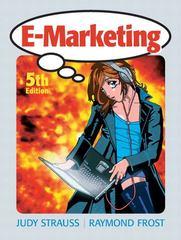Question
Question 1 When some people of European decent reached what is now Washington State a long time ago, its rivers were full of salmon returning
Question 1
When some people of European decent reached what is now Washington State a long time ago, its rivers were full of salmon returning to their spawning grounds in fall. (Note that adult salmon return from the sea to the exact rivers where they were born.) At that time, river sites suitable for setting salmon traps were owned by some members of the local population (called the Indians at that time). Trap sites were owned by families or individuals.
Q1-A: Why didn't the Indians deplete salmon populations? Assume that they were as greedy as the people of European decent and that there was plenty of demand for smoked and dried salmon (2 points).
Eventually, the people of European decent formed their government. This government did not recognize the Indians' ownership of trap sites on rivers. This government declared that salmon was a common resource, and it allowed everybody to set traps anywhere to catch salmon.
Q 1-B: What do you think happened to salmon populations? And why? (2 points)
Question 2
There are two countries in Africa, Country A and Country B, both of which once boasted abundant elephants. The governments of both countries try to protect elephants, but the number of elephants in both countries has been steadily declining because of poaching (illegal hunting). These countries are poor, and the governments of both countries are hard up for cash; they both employ only limited numbers of rangers to crack down on poaching, and these rangers are not well paid. In both countries, farmers are in conflict with elephants because elephants often destroy their crops and kill farmers occasionally.
Country A has recently passed a new law which allows farmers toownelephants. This private property system of elephants is similar to that once existed in the Western States in the United States in the 19thcentury, where farmers owned free-ranging cattle and individual cows were branded to indicate their owners. Under this new law, farmers who own elephants can slaughter them and sell their meat and tusks (ivory) as they like.
Country B, on the other hand, was appalled by this recent policy adopted by Country A. Country B is sticking to its long-standing policy that bans the private ownership of wildlife including elephants. Country B passed a new law that made poaching a felony punishable with a jail sentence. Killing an elephant is already a crime in this country.
Q2-A:In which country do farmers have a stronger incentive to cooperate with poachers (e.g., secretly telling poachers where they can find elephants)?Explain why.(2 points)
Q2-B:Against the new policy in Country A, one wildlife conservationist declared, "This new policy will devastate elephant populations in Country A because greedy owners care only about money! They will kill all the elephants with tusks as soon as possible!" Is this conservationist correct?Explain how you reached your conclusion. (2 points)
Question 3.
Your economics instructor has told you that socialism does not work. In other words, he has said that socialism cannot satisfy people's needs as well as capitalism (= market-based economic system) does. He gave several reasons for his conclusion. What is his criticism of socialism? Explain at leastthree reasonsfor his conclusion. (If you support socialism, you need to refute his criticism. In order to do so, you need to understand what his criticism is. Demonstrate you understanding of your instructor's criticism.) (3 points)
Notes:
Socialism is a long-standing economic thought which strives to achieve economic equality by abolishing private property. It abolishes private property because private property is regarded as the source of economic inequality. It replaces private enterprise with government planning of all economic activities.
Karl Marx and Friedrich Engels are the two, most prominent proponents of socialism.
Some socialists regard communism as an advance form of socialism. The word 'communist' also means someone who supported (supports) the Soviet Union and its ruling communist party.
The Russian Revolution (1917-1923) created the world-first socialism country, the Soviet Union.
Currently, North Korea, Cuba, and China (in reality - one party dictatorship based on state capitalism and nationalism) are remaining socialist countries around the world.
Step by Step Solution
There are 3 Steps involved in it
Step: 1

Get Instant Access to Expert-Tailored Solutions
See step-by-step solutions with expert insights and AI powered tools for academic success
Step: 2

Step: 3

Ace Your Homework with AI
Get the answers you need in no time with our AI-driven, step-by-step assistance
Get Started


